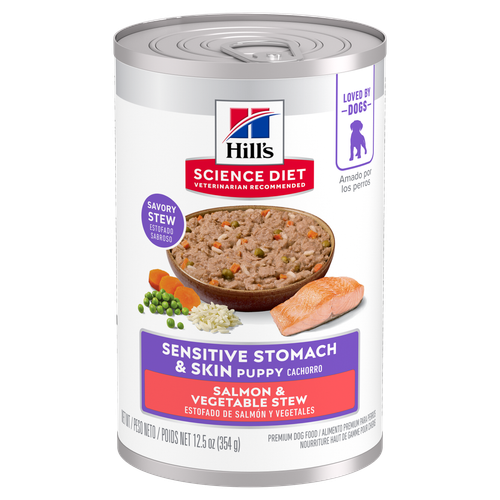
-
Find the right food for your petTake this quiz to see which food may be the best for your furry friend.Find the right food for your petTake this quiz to see which food may be the best for your furry friend.Featured products
 Healthy Cuisine, Adulte, assortiment de conserves
Healthy Cuisine, Adulte, assortiment de conservesHill's Science Diet Healthy Cuisine Variety Pack
Shop Now Sensitive Stomach & Skin, assortiment de conserves
Sensitive Stomach & Skin, assortiment de conservesHill's Science Diet Sensitive Stomach & Skin Variety Pack
Shop Now Adult Perfect Weight & Joint Support Hearty Vegetables and Tuna Stew Dog FoodShop NowFeatured products
Adult Perfect Weight & Joint Support Hearty Vegetables and Tuna Stew Dog FoodShop NowFeatured products Perfect Weight Salmon & Vegetable Canned Cat Food
Perfect Weight Salmon & Vegetable Canned Cat FoodOver 70% of cats lost weight within 10 weeks when fed this nutrition
Shop Now Adult 7+ Tender Chicken Dinner Cat Food
Adult 7+ Tender Chicken Dinner Cat FoodWith delicious chunks in a decadent gravy
Shop Now Adult Chicken & Spinach Casserole Cat Food
Adult Chicken & Spinach Casserole Cat FoodWith delicious chunks in a decadent gravy
Shop Now -
Dog
- Dog Tips & Articles
-
Health Category
- Weight
- Food & Environmental Sensitivities
- Urinary
- Digestive
- Joint
- Kidney
- Dental
- Cancer
-
Life Stage
- Puppy Nutrition
- Adult Nutrition
- Senior Nutrition
Cat- Cat Tips & Articles
-
Health Category
- Weight
- Skin & Food Sensitivities
- Urinary
- Digestive
- Kidney
- Dental
- Stress
- Cancer
-
Life Stage
- Kitten Nutrition
- Adult Nutrition
Featured articles The Incredible Science Behind Your Pet's Microbiome
The Incredible Science Behind Your Pet's MicrobiomeLearn what a pet's microbiome is, how it contributes to your pet's gut & overall health, and why nutrition is important in maintaining healthy microbiomes.
Read More Compare Your Pet Food's Calories to Other Brands
Compare Your Pet Food's Calories to Other BrandsCompare Hill's Science Diet dog and cat food's calories against other pet food brands and AAFCO recommended maximum calorie count.
Read More Pet Food Storage Tips
Pet Food Storage TipsDiscover how and where to store your dry, as well as canned, dog and cat food. Learn how to find the "best before" dates on all Hill's pet food packaging.
Read More -


Don't let your cute puppy turn into an aggressive dog
A lot of people think dogs bite "because that's what they do". But dogs don't become aggressive without good reason, and most dogs express aggression because they find themselves in a stressful situation. So it stands to reason that the best way to prevent your puppy from becoming an angry or aggressive dog later is to help him to avoid or tolerate stressful situations. You should learn to recognize signs of fear such as being backed into a corner, or being restricted by his lead.
Fear is the common factor
To become afraid, dogs don't necessarily need to have had a nasty experience. Dogs that are fear-stricken are those that don't get the opportunity to socialize with enough people. So socialization is very important - for advice on socialization click here. If your puppy is brought up to see people (grown-ups and children alike) as providers of fun, praise and treats, they won't need to display threatening behaviour.
You should also expose your puppy to noises and situations that might frighten them from a young age, to help them overcome their fears. Then potentially scary things, like the vacuum cleaner, traffic or the postman, become everyday occurrences they take in their stride.


Tasty Tips
Your puppy and other people
All people are different, whether they're friends, family or strangers - and in the eyes of a puppy, the different ages, shapes and sizes we humans come in can be mightily confusing. So make sure he encounters as many people as possible from an early age. That way, strangers will seem less strange and he'll soon learn to become calmer and more trusting. Just make sure all these new friends don't overwhelm him with vigorous displays of affection.
It's also important that your puppy becomes acquainted with children. Few youngsters can resist fussing over a puppy and although they mean no harm, this can be alarming for the dog. It's a good idea to take your puppy for a walk near the local school; children will need no encouragement to come up and say hello. But don't forget that puppies can become tired quickly, so make sure any meeting times are kept quite short and give your puppy time to rest.
Play-biting shouldn't get out of hand
Before you collected your new puppy, he was used to playing with his own brothers and sisters. And play-biting is a puppy's natural game. So once he's settled into his new home, he'll want to play-bite with you. But to curb excessive biting, you'll need to divert his attention away from your hands to his toys.
The chances are, whenever you spend time with your puppy, stroking and making a fuss of him, he'll want to chew on your hand, so make sure you have one of his toys ready. Make it hard for him to bite your hand by making a fist and offer a toy instead, waving and ,wiggling it around him. It won't be long before he learns that toys are lot more fun to play with and chew than a big fist.
Your puppy only knows what you teach him
It's important to remember that whatever you teach your puppy now will be normal behaviour for your grown dog. So when he's playing as a puppy, try thinking of him as a mature dog, and judge whether his behaviour is acceptable or otherwise. If he starts growling, or attempting to bite a hand holding a toy, or rushing a young child during play, stop the game at once and walk away with the toy. He'll soon learn why the fun stopped and avoid the behaviour that caused it.
If you have any concerns about your puppy's behaviour, or would like more information about available books, training courses or classes, your vet will be pleased to advise you.


One of our staff authors prepared this article for you
Related products

Hill's Science Diet Healthy Cuisine Variety Pack


Hill's Science Diet Sensitive Stomach & Skin Variety Pack

Gentle on stomachs while nourishing skin & supporting development in growing puppies
Related articles

Learn how to stop your dog from begging at the dinner table, and understand how it can help contribute to his health.

Gather the following puppy supplies to prepare your family for all the fun (and commitment) that comes with being a dog parent.

Proper nutrition for your pregnant or nursing dog is vital to her and her puppy's health. Learn what you should do provide her with the proper nutrients.

Discover fun and engaging games and other ways to help your dog exercise, keeping him happy and healthy.

Put your dog on a diet without them knowing
Our low calorie formula helps you control your dog's weight. It's packed with high-quality protein for building lean muscles, and made with purposeful ingredients for a flavorful, nutritious meal. Clinically proven antioxidants, Vitamin C+E, help promote a healthy immune system.
Put your dog on a diet without them knowing
Our low calorie formula helps you control your dog's weight. It's packed with high-quality protein for building lean muscles, and made with purposeful ingredients for a flavorful, nutritious meal. Clinically proven antioxidants, Vitamin C+E, help promote a healthy immune system.


